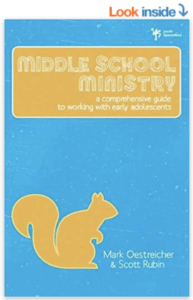Some people think that middle schoolers only think about food, video games, and girlfriends/boyfriends (not necessarily in that order).
It might be true that middle schoolers think about those things a lot of the time. But there’s often more going on in their heads (and hearts) than we might think.
Hello, puberty…
In their book, Middle School Ministry, Mark Oestreicher and Scott Rubin discuss how the onset of puberty opens the way for students to think in more abstract ways.
On the one hand, the shift to abstract thinking is exciting: “It opens up new opportunities for understanding, ownership, [and] application” (p. 134).
On the other hand, the shift is challenging: “It necessarily calls into question childhood beliefs that no longer work or no longer make sense” (p. 134).
It’s important for us to help students work through their questions and doubts instead of ignoring them.
Here’s one way to do that…
I was excited when a middle school pastor asked me to be part of a panel that would discuss some tough questions about God, faith, life, and the Bible.
He had given out a blank index card and a pen to every middle school student in his group. Then he told them to write down their biggest question about God. It could be related to the Bible, faith, Jesus, or whatever. Nothing was off-limits.
Even better, the questions they wrote were anonymous.
Here are 5 of their questions:
1. Why does God let tragic things happen?
2. Is there any proof that God and Jesus are real?
3. What is God’s opinion of other religions?
4. Why didn’t God just make us perfect after what Adam and Eve did?
5. Why do I feel like God is never with me?
After he got the questions from the students, he invited a few people (including me) to have a panel discussion about the answers.
My point here is not to tell you how I answered each question (I do that in my book, Considering Christianity). My point is that middle schoolers can think deeply about their faith.
Your Move
Dodgeball and pizza are fun. But don’t stop there. Give your students something with substance. And give them permission to be curious, ask their questions, and express their doubts. Their faith and your ministry will be stronger because of it.
Suggested Resource
Latest posts by Trevor Hamaker (see all)
- 7 Ways to Deal with Disruptive Students - December 18, 2024
- Fighting Frustration by Shifting Your Focus - December 18, 2024
- What is the Most Important Job of a Small Group Leader? - December 18, 2024
Did You Like This Post?
Sign up to get updates sent to your inbox each week!
You're in! Want more ideas and support for your ministry? Check out the BYM Community!
http://bit.ly/bymcommunity


